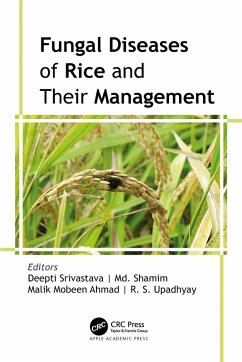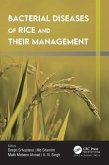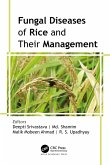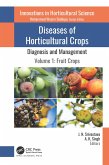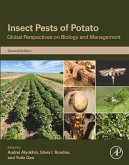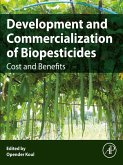Fungal Diseases of Rice and Their Management (eBook, ePUB)
Redaktion: Srivastava, Deepti; Upadhyay, R. S.; Ahmad, Malik Mobeen; Shamim, Md.


Alle Infos zum eBook verschenken

Fungal Diseases of Rice and Their Management (eBook, ePUB)
Redaktion: Srivastava, Deepti; Upadhyay, R. S.; Ahmad, Malik Mobeen; Shamim, Md.
- Format: ePub
- Merkliste
- Auf die Merkliste
- Bewerten Bewerten
- Teilen
- Produkt teilen
- Produkterinnerung
- Produkterinnerung

Hier können Sie sich einloggen

Bitte loggen Sie sich zunächst in Ihr Kundenkonto ein oder registrieren Sie sich bei bücher.de, um das eBook-Abo tolino select nutzen zu können.
Rice is a widely consumed crop around the world that has tremendous importance and is cultivated almost everywhere except Antarctica. However, various biotic and abiotic stresses have a negative effect on rice cultivation, seriously reducing its yield. This volume examines the bacterial and fungal pathogens that cause rice diseases and explores how to manage these diseases. It covers the economic and environmental impact of rice fungal diseases on global food security and proceeds to delve into diagnostic methods for rice fungal pathogen detection and discusses current strategic and applied…mehr
- Geräte: eReader
- mit Kopierschutz
- eBook Hilfe
![Bacterial Diseases of Rice and Their Management (eBook, ePUB) Bacterial Diseases of Rice and Their Management (eBook, ePUB)]() Bacterial Diseases of Rice and Their Management (eBook, ePUB)136,95 €
Bacterial Diseases of Rice and Their Management (eBook, ePUB)136,95 €![Diseases of Horticultural Crops: Diagnosis and Management (eBook, ePUB) Diseases of Horticultural Crops: Diagnosis and Management (eBook, ePUB)]() Diseases of Horticultural Crops: Diagnosis and Management (eBook, ePUB)136,95 €
Diseases of Horticultural Crops: Diagnosis and Management (eBook, ePUB)136,95 €![Diseases of Horticultural Crops: Diagnosis and Management (eBook, ePUB) Diseases of Horticultural Crops: Diagnosis and Management (eBook, ePUB)]() Diseases of Horticultural Crops: Diagnosis and Management (eBook, ePUB)136,95 €
Diseases of Horticultural Crops: Diagnosis and Management (eBook, ePUB)136,95 €![Fungal Diseases of Rice and Their Management (eBook, PDF) Fungal Diseases of Rice and Their Management (eBook, PDF)]() Fungal Diseases of Rice and Their Management (eBook, PDF)145,95 €
Fungal Diseases of Rice and Their Management (eBook, PDF)145,95 €![Diseases of Horticultural Crops: Diagnosis and Management (eBook, ePUB) Diseases of Horticultural Crops: Diagnosis and Management (eBook, ePUB)]() Diseases of Horticultural Crops: Diagnosis and Management (eBook, ePUB)136,95 €
Diseases of Horticultural Crops: Diagnosis and Management (eBook, ePUB)136,95 €![Insect Pests of Potato (eBook, ePUB) Insect Pests of Potato (eBook, ePUB)]() Insect Pests of Potato (eBook, ePUB)113,95 €
Insect Pests of Potato (eBook, ePUB)113,95 €![Development and Commercialization of Biopesticides (eBook, ePUB) Development and Commercialization of Biopesticides (eBook, ePUB)]() Development and Commercialization of Biopesticides (eBook, ePUB)127,95 €
Development and Commercialization of Biopesticides (eBook, ePUB)127,95 €-
-
-
Dieser Download kann aus rechtlichen Gründen nur mit Rechnungsadresse in A, B, BG, CY, CZ, D, DK, EW, E, FIN, F, GR, HR, H, IRL, I, LT, L, LR, M, NL, PL, P, R, S, SLO, SK ausgeliefert werden.
- Produktdetails
- Verlag: Taylor & Francis eBooks
- Seitenzahl: 424
- Erscheinungstermin: 9. Januar 2024
- Englisch
- ISBN-13: 9781000771909
- Artikelnr.: 69096142
- Verlag: Taylor & Francis eBooks
- Seitenzahl: 424
- Erscheinungstermin: 9. Januar 2024
- Englisch
- ISBN-13: 9781000771909
- Artikelnr.: 69096142
- Herstellerkennzeichnung Die Herstellerinformationen sind derzeit nicht verfügbar.
Security 2. A Review on Diagnostic Methods for Rice Fungal Pathogens 3.
Investigation of Ecology, Molecular, and Host-Pathogen Interactions of Rice
Blast Pathogens and Management Approaches 4. A Review of Conventional and
Molecular Approaches for the Management of Rice Blast Disease 5.
Computational Deciphering of Blast Resistance Genes Rice 6. An Update on
Epidemiology of Sheath Blight Pathogen of Rice and Its Management 7.
Insights from Genetics, Breeding, and Molecular Approaches for Rice Sheath
Blight Disease Resistance 8. The Current Scenario, Progress, and Prospects
of Bioinformatics for Rice Sheath Blight Disease Resistance 9. An Overview
of Ecology, Epidemiology, and Identification Measures for Rice Sheath Rot
Disease 10. Research Status and Prospectus of Sheath Rot Disease Resistance
in Rice 11. Rice Brown Spot Disease (Helminthosporium oryzae): Ecology,
Epidemiology, and Identification Measures 12. Comparative Analysis of
Conventional and Molecular Methods for Rice Brown Spot Disease Resistance
13. Ecological Status and Biology of Rice Kernel Smut Pathogen 14. Current
Scenario of Progress and Prospects for the Management of Rice Kernel Smut
Disease Resistance 15. Identification and Pathogenic Diversity of Rice Smut
Pathogen and Their Resistance Resources for Future Breeding 16. Emerging
Biotechnological Tools for Rice Bakanae/Foot Rot Disease Resistance 17.
Potential of Bio-Control Agents for the Sustainable Management of Rice
Fungal Diseases 18. New Insights from the Bioinformatics Tools for Rice
Fungal Disease Resistance
Security 2. A Review on Diagnostic Methods for Rice Fungal Pathogens 3.
Investigation of Ecology, Molecular, and Host-Pathogen Interactions of Rice
Blast Pathogens and Management Approaches 4. A Review of Conventional and
Molecular Approaches for the Management of Rice Blast Disease 5.
Computational Deciphering of Blast Resistance Genes Rice 6. An Update on
Epidemiology of Sheath Blight Pathogen of Rice and Its Management 7.
Insights from Genetics, Breeding, and Molecular Approaches for Rice Sheath
Blight Disease Resistance 8. The Current Scenario, Progress, and Prospects
of Bioinformatics for Rice Sheath Blight Disease Resistance 9. An Overview
of Ecology, Epidemiology, and Identification Measures for Rice Sheath Rot
Disease 10. Research Status and Prospectus of Sheath Rot Disease Resistance
in Rice 11. Rice Brown Spot Disease (Helminthosporium oryzae): Ecology,
Epidemiology, and Identification Measures 12. Comparative Analysis of
Conventional and Molecular Methods for Rice Brown Spot Disease Resistance
13. Ecological Status and Biology of Rice Kernel Smut Pathogen 14. Current
Scenario of Progress and Prospects for the Management of Rice Kernel Smut
Disease Resistance 15. Identification and Pathogenic Diversity of Rice Smut
Pathogen and Their Resistance Resources for Future Breeding 16. Emerging
Biotechnological Tools for Rice Bakanae/Foot Rot Disease Resistance 17.
Potential of Bio-Control Agents for the Sustainable Management of Rice
Fungal Diseases 18. New Insights from the Bioinformatics Tools for Rice
Fungal Disease Resistance
